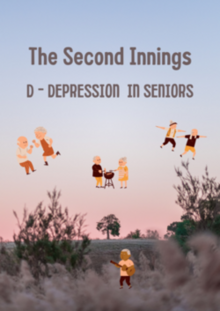
As per the dictionary, “depression” means – feelings of severe despondency and dejection. Some say, depression is the state of feeling very unhappy and without hope for the future. Everyone feels sad or low some time or the other. It is part of life. But if such feelings go for few weeks or months, then it is depression. It is much more than the feeling of sadness. It is a serious mood disorder. It is seen that many seniors are affected by this. Depression is not trivial as many people think. It is a real illness. It is also neither a sign of weakness.
Depression affects different people in different ways. They range from feeling unhappy, hopeless, feeling tearful, losing interest in their favourite activities, anxiety, low in spirits etc. If left untreated, depression culminates to severe depression and make one feel life is not worth living and many times suicidal tendencies develop. WHO has also recognised depression as a major health challenge in the developing countries.
With people living longer, existence of nuclear and smaller families, children moving out faster than ever, world becoming a global village, breaking up of joint family system, no governmentlal social security like in developed countries, absence of affordable and good geriatic medical facilities and social stigma about mental illness are some of the reasons, depression and depressed never come to the forefront.
In recent years, a rise in elderly- communities had been observed. Though personally, I am not a fan of such senior living but these are becoming popular with people whose children are settled abroad and they do not want to leave India. I feel, when you live in an inclusive society, with people of all age groups, the interactions with people are vibrant. While if I can envisage the conversation among the residents of old age homes, it might be around health issues, death and alike.
Many studies in India and around the world have been conducted and it has been found that depression in seniors is a real thing and it is serious. A study revealed that depression in seniors is more in unmarried or who have lost their partners than married people living with their spouses. It is more in the people living in old age homes or senior communities rather than people living in their own homes. Financial strength and stability is another reason which decides the level of depression. It was seen that depression is less in financially independent seniors than those whose financial condition is precarious. The same is true for physical health status too. Though some universities and institutions have undertaken these studies, I think we can very much predict these realities without any studies. Common sense, my friend. 🙂
Depression has been identified as the greatest burden for the elderly. It decreases the quality of life and restricts independence. If depression is left untreated, it can have significant social implications in life. Early recognition, diagnosis, and treatment in older people may help in improving their quality of life, and prevent suffering or premature death. It will help in maintaining optimal levels of function and independence. Early diagnosis and effective treatment in old age is very important.
Unfortunately, many depressed older adults fail to identify the symptoms of depression. This results in not getting any treatment or help they require. The elderly depression is so often overlooked because people believe that being down is part of old age. They are isolated in society. The social changes are such that every one is getting busier and busier in their own life. We generally ignore seniors. So, with few people around, this distressed situation is not noticed. Also, seniors are reluctant to speak about their feelings. The thought is the fear of becoming a burden to someone else.
Here I would like to tell seniors that depression is not an inevitable part of growing old. Nor is a sign of weakness or a flaw in character. It can happen to anyone, at any age, no matter your background or your previous accomplishments in life. While life changes as you age—such as retirement, the death of loved ones, declining health can sometimes trigger depression, they don’t have to keep you down. No matter what challenges you face as you age, there are steps you can take to feel happy and hopeful once again and enjoy your golden years.
Signs & Symptoms of Depressions –
Let us check the depression red flags here:,
Sadness or feelings of despair, unexplained aches and pains, loss of interest in hobbies and socialising, feeling of hopelessness or helplessness, lack of motivation or energy, sleep disturbances, loss of self-worth, slowed movement or speech. The most terrible is the thoughts of suicide or fixation of death. They also start neglecting personal care or skipping meals
How to avoid depression?
What should be done to avoid depression in the post sixty years of life? As I had mentioned depression is avoidable in old age. It is time to accept that retired life is a second innings which is totally different from the earlier life and it should be led with the new rule book.
It’s a myth that after a certain age one can’t learn new skills or do new activities, or make fresh lifestyle changes. The truth is that the human brain never stops changing, you’re just as capable as a young person of learning new things and adapting to new ideas. It is a good idea to stay physically and socially active and feel connected to the community and loved ones. This is the time to live for self. You had lived for the family. Now is the time to enjoy with your own self. Keep in touch with friends. Develop healthy habits. Make health your priority. Go out, travel, meet people, join a club or a group. Share your knowledge. Find a purpose in life. Volunteer your time. Giving happiness to someone else is the best gift which one can give to self. It helps create so much positivity and one feel better about self. This also helps in expanding your social network..
And lo, this results in so much positivity all around.
I am participating in #BlogchatterA2Z .
I will be writing 26 posts in April. My theme is “Second innings”. You can check my other posts on the issues of retired life here.
